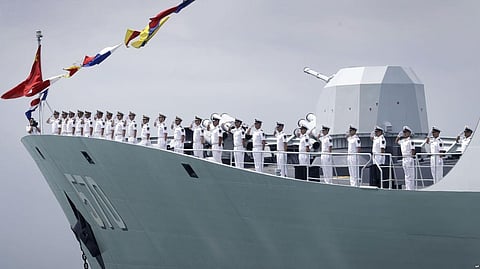
- Union Budget 2026
- Home
- NewsGram USA
- India
- न्यूजग्राम
- World
- Politics
- Entertainment
- Culture
- Lifestyle
- Economy
- Sports
- Sp. Coverage
- Misc.
- NewsGram Exclusive
- Jobs / Internships

Taipei, Taiwan, October 27: China-ASEAN Naval Exercise proposed for next year will ease a stalemated dispute over the South China Sea by letting adversaries meet one another's front-line personnel and work on common issues, experts in the region say.
Singapore's Defense Minister Ng Eng Hen and his Chinese counterpart Chang Wanquan agreed Monday to plan for the first maritime exercise with ships from China and the 10-member Association of Southeast Asian Nations (ASEAN), the Singaporean defense ministry said on its website. Singapore will lead the association next year.
Beijing has angered four Southeast Asian states by expanding its coast guard and military presence in the South China Sea, a 3.5 million-square-kilometer tract of water rich in fisheries and fuel reserves. Claims by Brunei, Malaysia, Vietnam and the Philippines overlap that of China, which calls nearly the whole sea its own.
China-ASEAN Naval Exercise would break down suspicion by letting naval personnel meet one another, said Termsak Chalermpalanupap, political and security affairs fellow with the ISEAS Yusof Ishak Institute in Singapore. Foreign ministries, he added, would be in charge of handling disputes.
"I think it's good to have the joint exercise," Chalermpalanupap said. "At least interpersonal contact, that will be important."
Nonpolitical focus
Joint exercises will be especially welcomed if they cover search and rescue work or efforts to stop piracy at sea, said Oh Ei Sun, international studies instructor at Singapore Nanyang University. The countries must avoid politics to ensure the success of any maneuvers, he said.
"They would have to really focus on the exercise at hand and all sides should not try to in any way, shall we say, proclaim sovereignty during the exercise," Oh said.
China began to expand in the sea in 2010 by reclaiming land to build artificial islands, some apparently for military use. It's ready to deploy radar systems and fighter jets on some, according to the Asia Maritime Transparency Initiative under American think tank Center for Strategic & International Studies.
China's coast guard ships, oil rigs and unilateral fishing bans in disputed waters have further riled Southeast Asian countries.(VOA)
